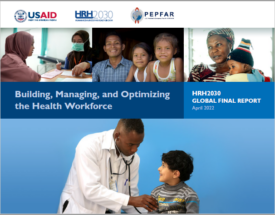In many low- and middle-income countries, health systems face shortages of qualified health workers, and decision-makers lack the data and tools needed to optimize existing resources.

Final Report: Human Resources for Health in 2030 .
Project Report | August 24, 2022

This final report details the program’s achievements, and looks at the road ahead for health system to further strengthen the health workforce and advance universal health coverage.
The Human Resources for Health in 2030 (HRH2030) program is a global, six-year cooperative agreement funded by USAID and PEPFAR to help low- and middle-income countries develop the health workforce needed to prevent maternal and child deaths, support the goals of Family Planning 2020 (now 2030), control the HIV/AIDS epidemic, and protect communities from infectious diseases.
HRH2030 worked in more than 30 countries to build health worker competencies, skill mix, productivity, and performance, while also supporting local, regional, and national governments to strengthen their capacity to ensure a high-quality, high-performing workforce.
This report details the program’s achievements and looks at the road ahead for health systems to further strengthen the health workforce and promote, protect, and maintain accountable, affordable, accessible, and reliable health coverage.
- Report HRH2030 Global Final Report
- Report HRH2030 Final Report Annexes
